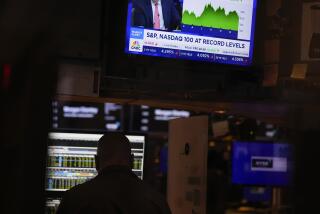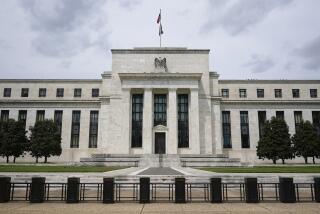New York Fed to monitor Facebook and Twitter
- Share via
The Federal Reserve Bank of New York wants you to friend it — or at least understand why you won’t friend it.
In a move that illustrates its sensitivity to public perception, the Fed bank is seeking bids from companies to help monitor what’s being said about it on social media such as Facebook and Twitter.
The bank said in its bid request that it wants to “continuously monitor conversations” and “identify and reach out to key bloggers and influencers.”
“The New York Fed is committed to improving its communications and engagement with the public in order to enhance and improve the public’s understanding of its activities and the role it plays in supporting the U.S. economy,” a Fed spokesman said in a statement. “To do that effectively, the New York Fed is interested in getting a better sense of the relevant concerns and discussions that are taking place in the public domain.”
Word of the move has exploded in the blogosphere — and if the Fed were monitoring social media currently it would find, not surprisingly, that the commentary has been less than flattering. Much of it, in fact, is of the Big Brother variety.
“What they really want to do is to gather information on everyone that views the Federal Reserve negatively,” wrote the Economic Collapse blog. “It is unclear how they plan to use this information once they have it, but considering how many alternative media sources have been shut down lately, this is obviously a very troubling sign.”
In a report to clients, Nicolas Colas, chief market strategist at ConvergEx Group in New York, tried to put the firestorm into context, albeit tongue-in-cheek.
“When leading presidential candidates threaten the head of the nation’s central bank with charges of treason, it is safe to say that criticizing the Fed is the status quo position,” Colas wrote. “Throw a bucket of deep-friend Oreos at any number of state fairs this fall and the majority of people you’ll hit will likely have an unkind word or two about the U.S. central bank and its handling of the banking system over the last decade.”
The antipathy among parts of the public is largely the result of frustration over the weak economy and high unemployment rate, Colas says.
“If most Americans have a dim view of the institution (and they clearly do),” Colas wrote, “it is likely because the economy is still stuck in the mud of the most recent financial crisis rather than any immovable prejudice to the institution.”
More to Read
Inside the business of entertainment
The Wide Shot brings you news, analysis and insights on everything from streaming wars to production — and what it all means for the future.
You may occasionally receive promotional content from the Los Angeles Times.










